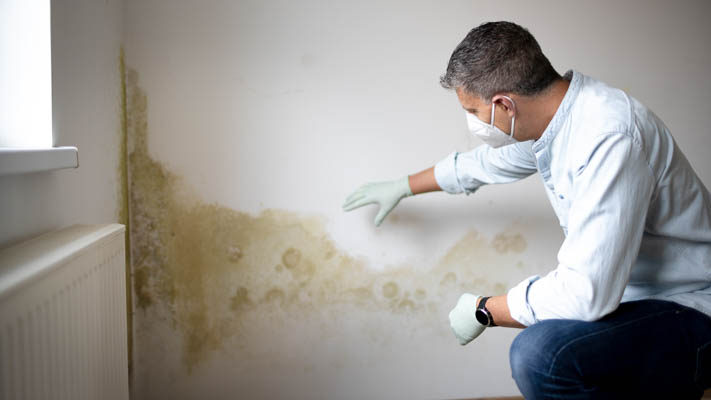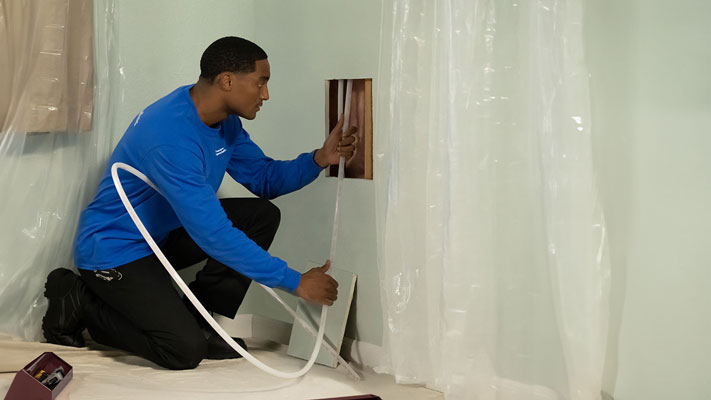Polybutylene: What is it and Where is it Used?
Polybutylene is a type of plastic potable water plumbing commonly found in many US homes built from the late 1970's through to the mid-1990's. Compared to copper piping, it was cheaper, easier to install, and offered benefits like resistance to freezing damage. It was especially popular in the Sunbelt states.
Polybutylene refers to the polymer used to make these pipes. They were often sold under the brand name Quest, and can be referred to with a variety of terms; including PB, PB-1, poly-pipes, or poly-b pipe.
It's important not to confuse polybutylene with CPVC or PVC piping, or modern cross-linked polyethylene (PEX) piping. Polybutylene is also different from the ABS plastic pipes commonly used in drains and sewer systems.
How Can I Tell if I Have Polybutylene Plumbing?
Polybutylene piping is typically gray and is only found in fresh water potable plumbing systems. The tubing is usually 1/2" to 1" in diameter and flexible. To identify them, check around your water heater, in attics or crawl spaces, along basement ceilings, and under sinks in cabinets.
Polybutylene pipes aren't used for drain, sewer, or vent lines. If you find the tell-tale gray tubing, look for the code "PB2110" printed on it. That would confirm your plumbing is polybutylene.
If you suspect you have poly pipes, but aren't sure - you can contact us for a free consult, and one of our local estimators would be happy to assist.
Get your free estimate today
With over 75,000 repipes completed, we've perfected our One-Stop Repipe™ for your home.
Why does Polybutylene Plumbing Fail?
Historically, there has been ongoing debate about why poly-pipes have failed.
In prior litigation, the industry behind polybutylene plumbing systems claimed failures were not due to the polybutylene tubing itself, but instead due to installation issues and inappropriate pipe connectors.
Supporting this claim, the industry points to the extensive and continued successful use of polybutylene plumbing in Europe and parts of Asia, where different pb connecting systems are used. When polybutylene leaks occur in US plumbing systems, the leaks are often at or near connectors.
In the US, it has become generally accepted that the failures are most likely due to chemicals in municipal water supplies reacting with polybutylene - and this is one of the primary reasons why homeowners won a largeclass-action lawsuit against Shell Oil ( who manufactured and marketed the polybutylene resin under the brand name Quest). We have an article that covers the class action lawsuits related to polybutylene plumbing.
Polybutylene is no longer an approved plumbing material for potable water systems in building codes across the US.
It is now mainly an academic exercise determining why a specific system failed and/or if an existing poly-b system may fail in the future. Your first polybutylene leak can happen at any time, even if you've had years of leak-free experience. Furthermore, even if your poly pipes never leak, its presence will unfortunately impact your home value and may affect your homeowners' insurance policy.
Should I Repair or Replace Polybutylene Plumbing?
If you've had the misfortune of having your polybutylene plumbing fail, you have to choose whether to fix just the leaking section of pipe, or repipe your entire home. Even if you haven't had a leak, it is still important to consider repiping polybutylene.
From our experience, once you've had one leak, it's usually a sign of a systemic problem, and more leaks are likely to follow. The damage from a polybutylene leak can quickly add up to more than the cost of a whole-home repipe — not to mention the ongoing expenses of repeated plumbing repairs.
If a leak happens inside a wall, it can go unnoticed for weeks or even months, slowly dripping and causing significant water and mold damage. Beyond the health risks of living with mold, mold remediation is highly intrusive and can be very costly.

Poly pipe failures can also be catastrophic, with high-volume leaks causing severe water damage—especially if they happen when you're not home to shut off the water. And let's just say, the cost can be eye-watering...
Bottom line: if you've had a poly pipe leak, the best course of action is unquestionably to go for a complete, whole-home repipe.
How Much Does It Cost to Replace Polybutylene Plumbing?
Whole-home repipe costs are influenced by a variety of factors, including:
- The type of repiping material used (with copper or PEX being the most common options today)
- The number of plumbing fixtures
- Accessibility of plumbing in walls, crawl spaces, basements, etc
- Where you are located geographically (labor and materials costs vary across cities and states)
- The type of company that performs your repipe
Whole home repiping is our specialty - in fact, it's all we do. We can usually perform a whole home repipe for a much lower cost than a generalist plumber. Most of our repipes fall somewhere between $4,500 and $15,000.
We'll replace all your polybutylene plumbing with new copper or PEX tubing. Our repipes come with a lifetime warranty, can include drywall repair, and are often completed in 1 or 2 days. Plus, we also have special financing options to make the process easier for you.
For more information, we have a detailed article on how much does it cost to replace polybutylene plumbing. Contact us to have one of our local estimators provide a free consultation and quote, delivered in-home or remotely.
Can I Sell My House with Polybutylene Piping?
We're not aware of any laws that would stop you from selling a home with polybutylene piping (building codes prohibit poly pipes in new construction or remodels). However, if you have polybutylene plumbing, you'll likely need to disclose it to potential buyers.
We perform many polybutylene repipe quotes for sellers planning a sale - or even for buyers, who want to factor repipe costs into their offers: even when there has been no history of PB pipe failures.
We've even seen sales fall through, when homeowners didn't know they had poly plumbing, but it was found during inspection. So- if you are considering a sale in the future, and your home was built at a time when poly pipes were commonly used (late 1970's through mid 1990's), we'd highly recommend being proactive and getting your plumbing checked out.
Will My Homeowners Insurance Cover Polybutylene Pipe Leaks?
Ultimately, only your specific insurance company can answer that question based on your specific circumstances.
Generally speaking however, we know insurance coverage for homes with poly piping has often been a headache for many homeowners. We've handled many repipes when insurance companies have required it as a condition of policy renewal or issuance.
Recently, we've noticed a surge of homeowners reaching out to us because their insurance companies have increased rates or excluded leak coverage, even when there haven't been any claims or polybutylene pipe leaks. It is worth noting that insurance companies will only cover certain types of water damage from polybutylene leaks.
For more details, check out our articles on polybutylene pipes and homeowners insurance coverage, tailored to specific states, including: Arizona, Utah, Florida, and Illinois.
Is There a Class Action Lawsuit for Defective Polybutylene Plumbing?
Historically, there has been quite a lot of litigation around polybutylene plumbing. We have an article that focuses specifically on polybutylene plumbing lawsuits.
Unfortunately, if you still have poly plumbing, and did not participate in prior polybutylene class-actions, your legal options are likely very limited. Disclaimer: we aren't lawyers, and aren't providing any legal advice here.
The most significant historical litigation was the Cox v. Shell Oil class-action lawsuit, culminating in close to a billion dollar settlement in 1995, being paid out to thousands of homeowners over subsequent years. The final eligibility deadlines for this class action expired many years ago.
In 2017, a new polybutylene class-action was filed with Hurt v. Shell Oil, which attempted to include homeowners left out in the prior 1995 settlement. This was dismissed in 2018 "with prejudice", meaning it can't be refiled.
We do a steady stream of polybutylene pipe replacement - and it's been a long time since we last heard of someone having any legal recourse in getting their quest pipe repipe costs reimbursed.
What is a Good Replacement for Polybutylene Pipe?
When it comes to replacing your polybutylene pipes, we recommend using either copper piping or PEX tubing.
We find the vast majority of our customers replace their poly pipes with PEX tubing due to their resiliance, flexibility, cost effectiveness, and lifespan. However, the choice between PEX and copper depends on the specific needs of each home.

Here at Repipe Specialists, our repiping services utilize only made-in-the-USA high quality copper (Grade L) or Uponor PEX tubing. Both systems are backed by a lifetime warranty.
Receive a Free Quote for Your Polybutylene Plumbing Repipe
Here at Repipe Specialists, we've fully replaced polybutylene plumbing in thousands of homes since 1991 using both copper piping and PEX tubing. We continually get positive customer feedback from customers about their overall home repipe experiences. We often exceed their expectations on:
- Speed: Our repipe crews typically complete a repipe in a day, returning on another day for wall patching.
- Convenience: Through our One-Stop Repipe™ process, we handle everything from permits, to wall patching, to inspections.
- Cleanliness: Our crews are trained to protect your home while working (we cover all surfaces with protective sheeting), and to clean up fully at the end of each day.
- Peace of Mind: Repipe Specialists is a fully licensed plumber in every state we operate in, and we back all of our repipes with a lifetime warranty.
- Financing programs: To help take the sting out of unplanned repipe expenses, we offer several financing programs.
- Price: As a specialist that performs hundreds of repipes a week, we can deliver high-quality repipes at a lower cost vs generalist plumbers. We have an article that covers repipe cost factors in detail. Our quotes typically range from $4,500 to $15,000 depending on the size and complexity of your project.
Schedule a free in-home consult, and one of our local repipe consultants will explain all your repipe options and provide you with a written, fixed-price quote. Fix polybutylene plumbing issues at the source, repipe now.

